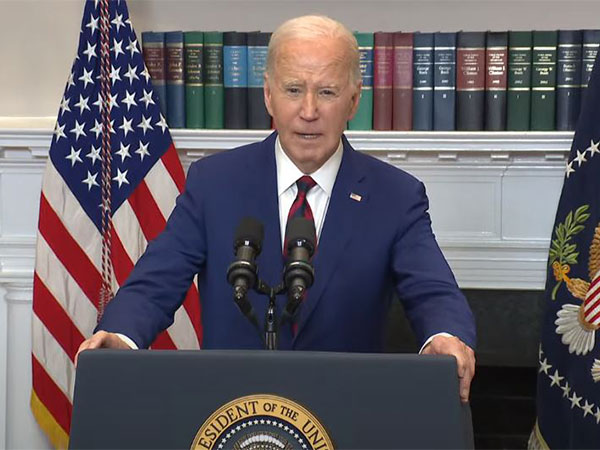Biden signs Ukraine aid, TikTok ban
Apr 25, 2024
Washington [USA], April 25: President Joe Biden signed a hard-fought bill into law on Wednesday that provides billions of dollars of new U.S. aid to Ukraine for its war with Russia, notching a rare bipartisan victory for the president as he seeks reelection and ending months of wrangling with Republicans in Congress.
The bill includes $61 billion in aid to Ukraine and $26 billion for Israel, as well as $1 billion in humanitarian assistance to Gaza and $8 billion to counter China's military might.
The impact of the legislation was immediate. Biden said he had approved an initial $1 billion in weapons supplies for Ukraine and that the flow of these arms would start within hours.
The initial aid package includes vehicles, Stinger air defense munitions, additional ammunition for high-mobility artillery rocket systems, 155mm artillery ammunition, TOW and Javelin anti-tank munitions and other weapons that can immediately be put to use on the battlefield.
Biden, a Democrat who is expected to face Republican former President Donald Trump in the November election, had pressed lawmakers for six months to approve more funding for Ukraine, which has been fighting a full-scale Russian invasion for more than two years. Trump objected to the Ukraine aid, and some Republicans in Congress refused to back it, questioning whether Ukraine could ever prevail.
Biden thanked House of Representatives Speaker Mike Johnson, the top Republican in Washington, for breaking the deadlock on the legislation and vowed to return soon to addressing border security, a top issue for Republicans.
Biden blamed "MAGA Republicans" loyal to Trump for spending months blocking the aid, referring to Trump's Make America Great Again slogan.
He said passage of the legislation sends a direct message to Russian President Vladimir Putin, whose military has been making gains in Ukraine.
Biden also signed a separate bill tied to the aid legislation that bans TikTok in the United States if its owner, the Chinese tech firm ByteDance, fails to divest the popular short video app over the next nine months to a year.
The social media platform is particularly popular with left-leaning young Americans, a group crucial to Biden's victory in November.
Congress's stalemate on the Ukraine aid bill ended when the Republican-controlled House of Representatives abruptly changed course and approved four bills that included funding for Ukraine, Israel, Taiwan and other U.S. partners in the Indo-Pacific on Saturday.
Biden and House Speaker Johnson held intense talks about Ukraine in February and the president has both pleaded with Republicans to back the package and scolded them for not doing so. Johnson, who faces calls by some right-leaning Republicans to oust him for his turnaround on aid, met with Trump in Florida earlier this month; the former president said Johnson was "doing a really good job."
The U.S. Senate followed the House on Tuesday evening, passing a sweeping bill that provides $61 billion in aid to the country, which has suffered setbacks in the war that supporters blame on the delay in getting the additional U.S. funding.
Heather Conley, an expert on European affairs, said the victory for U.S. allies and for Biden was tempered by effects that the delay has had for Kiev on the battlefield.
Biden has argued that he helped restore U.S. credibility on the world stage after Trump's tumultuous four-year tenure, in part by strengthening the NATO alliance and providing a united front against Russian President Vladimir Putin.
Trump has argued for an "America First" policy and has threatened to let NATO allies fend for themselves if they do not increase their defense spending.
Republicans who backed the aid package said it was not a vote for Biden but a reflection of their party's values.
Source: Fijian Broadcasting Corporation








